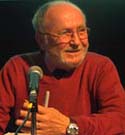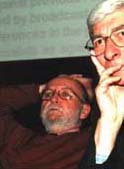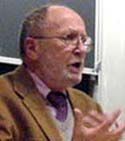|
James W. Carey, who died on May 23, was an important cultural historian and theorist of communications, an influential teacher of journalists, and a long-time friend to the MIT Communications Forum whose governing board he joined in 1995. Jim advised the Forum in countless valuable ways, helping to define its themes and long-term direction. He also made four memorable appearances at Forum events. Links to summaries of his remarks on those occasions are listed at the end of this essay. Though deeply learned, Jim retained a skepticism toward professional elites and a positive hatred of academic jargon. (His idea of journalism as democracy’s conversation, a citizen’s accessible discourse, is grounded here.) Suspicion of terminologies and of professorial complacency animates much of his writing, especially the seminal essays of the 1970s and early 1980s -- collected in Communication as Culture (1989) -- which helped to transform media study in the United States.
This anthropological or cultural notion of communication recognizes and even foregrounds the ideological work of media, but -- in instructive contrast to a great deal of recent media study -- it understands that communication systems, even the corporate entertainments of monopoly capitalism, never completely obliterate human agency. Culture is not a one-way process, so runs Carey’s continuing subtext. A domination model of social experience must oversimplify cultural transactions, which always contain elements of collaboration, of dialogue, of ritualized sharing or interaction. A progress model is similarly reductive, masking a rationale for established power and established ways of thinking and also underestimating the individual and communal, the interactive dimensions of culture.
Jim’s life as a teacher and writer embodied the democratic virtues of dialogue and intellectual collaboration, of course. The pluralist American philosophers John Dewey and William James are shaping spirits in his work, and his generous, lucid accounts of these ancestors and of such later figures as Clifford Geertz, Raymond Williams, and Harold Innis will continue to enlighten teachers, scholars, journalists and reader-citizens. --David
Thorburn
|
||||||||||||



